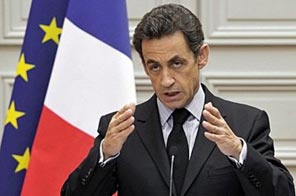Sarkozy takes on risky pension reform
PARIS: President Nicolas Sarkozy unveiled plans Monday to reform France's pension system, taking aim at a pillar of the welfare state in a move fraught with political risk for his presidency.
After meeting union leaders at the Elysee palace, Sarkozy said a bill outlining changes to state-run pensions would be presented to parliament in early September.
"We no longer can afford to delay decisions if we want to save pensions," Sarkozy said.
Sarkozy's right-wing government is seeking to open up negotiations on raising the retirement age from 60, arguing that this is the only way to keep the system of generous benefits afloat.
Like many other European countries, France is facing a funding shortfall in its state pension scheme due to a growing older population and fewer working-age people paying contributions.
This year, the state pension deficit is on track to reach nearly 11 billion euros (15 billion dollars), according to government figures.
Talk of raising the retirement age has been taboo in France where the right to a pension from age 60 has been enshrined since 1982, a legacy of Socialist president Francois Mitterrand's administration.
Many other European countries facing the same quandary plan to raise the retirement age, from 65 to 67 in the case of neighbouring Germany.
French newspapers said pension reform was shaping up as "the mother of all battles" for Sarkozy, who is struggling with near-record low approval ratings as he heads into the second half of his presidential term.
"The president is nuts. He wants to conquer the Himalaya of French politics: pension reform," commented Francis Brochet from the Progres de Lyon newspaper.
Following talks with Sarkozy, leaders from France's six major unions were to meet later Monday to agree on launching new nationwide protests, possibly for next month.
While France has pulled out of recession, unemployment remains high and unions complain that workers should not have to give up hard-won benefits when they are already struggling from the global downturn.
"Things are going to move quite quickly," commented Bernard Thibault, head of France's biggest union, the CGT.
"Workers must speak out on this issue if they do not want to be confronted with new sacrifices," he said.
Jean-Claude Mailly, head of the Force Ouvriere union, made clear Sarkozy will be facing a fight.
"We do not accept a later retirement age and we do not accept lengthening the period for contributions," he said.
"Consensus will be difficult to reach on this issue."
Sarkozy had initially suggested that a bill could come before parliament in July but at the Elysee meeting he opted instead for September.
Unions leaders, government ministers and business representatives will begin meetings in April to try to hammer out a common position on the way forward.
The decision to push back pension reform showed that Sarkozy may be hoping to keep the contentious issue out of public debate during the campaign for next month's regional elections.
Sarkozy's governing UMP party is hoping to score some gains from the Socialist opposition, which controls 20 of France's 22 regions.
Socialist opposition leader Martine Aubry caused a furore last month when she suggested that legal retirement age could go up to 62 and she was forced to back down under pressure from party stalwarts and unions.
A poll published Monday showed that some 48 percent all French plan to retire between ages 60 and 64 but 40 percent said they could work past age 65.
About 28 percent of those surveyed in the BVA poll said they agreed that the legal age could be pushed to over 60, while 21 percent said pension contributions should be increased.






